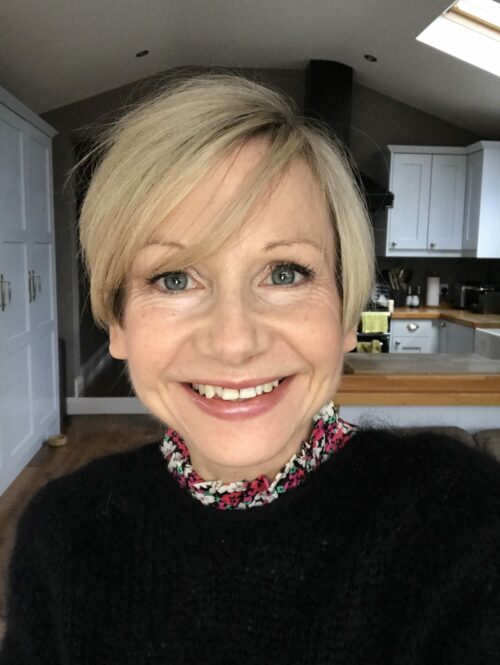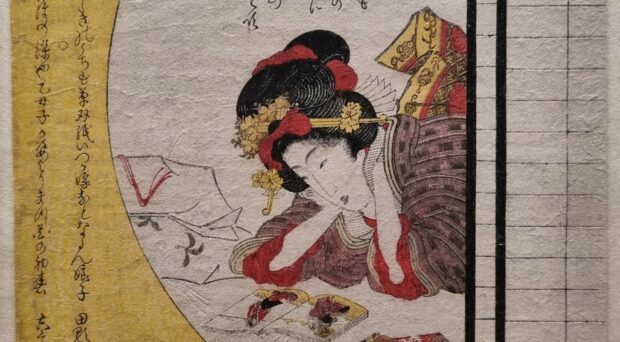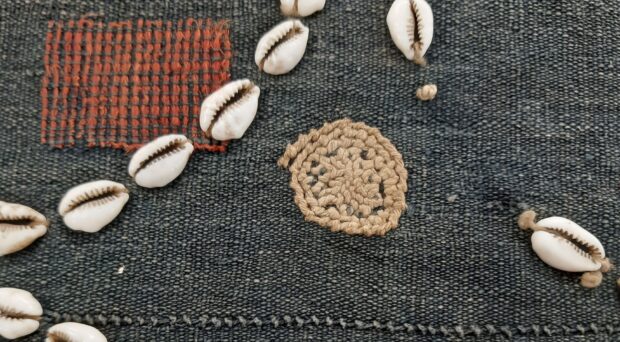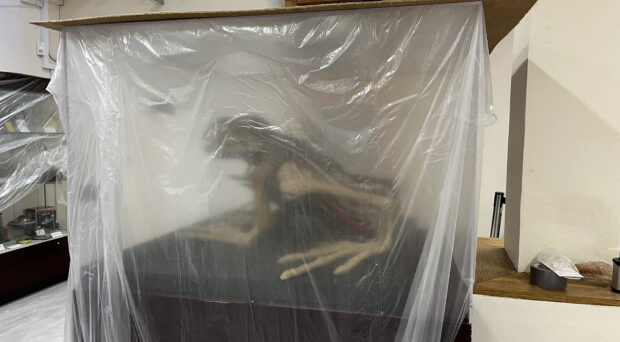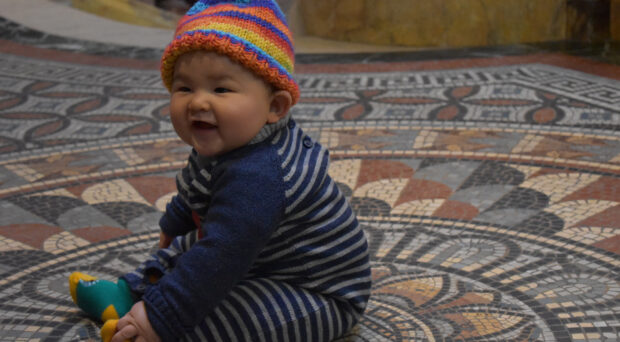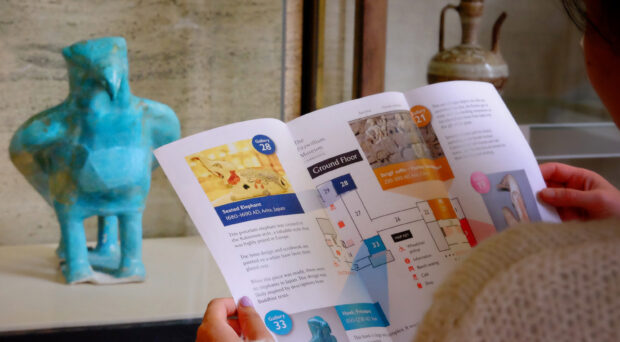The beginning of the year got off to a flying start for our Collections in Action programme. Working with local partners, creative practitioners, schools and audiences, our museums have delivered a whole range of events and activities under our themes of Social Justice, Our Planet, Creating Opportunities, Health and Wellbeing. Behind the scenes we’ve also been hard at work planning and delivering activity which supports and enables the delivery of our work. Read on for a snapshot of what’s been happening.
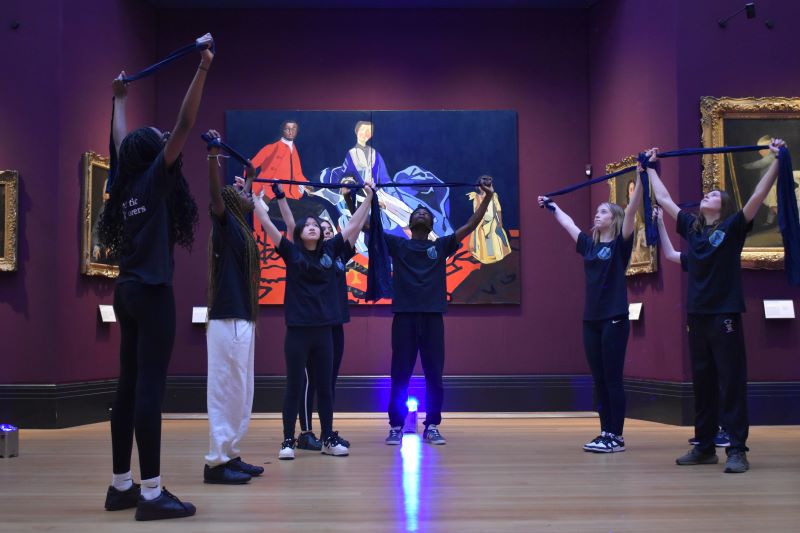
Activity Programme Delivery
This period has seen us continue to deliver programmes of work around the main themes of Social Justice, Our Planet, Creating Opportunities, Health and Wellbeing, and Programme Enablement.
Well-established projects, such as our Bridging Binaries tours, foregrounding the history and voices of LGBTQ+ communities, our Portals to the World offer for people living with dementia, and our Young Parents programme, have continued to evolve and develop. We have also been evolving new ways of working with collections, audiences, and creative practitioners, supported by our Collections in Action research and development grants such as a new Pride in Nature trail at the Museum of Zoology, and Climate Pasts Climate Futures led by the Sedgwick Museum.
Case Studies: Social Justice
Our Bridging Binaries LGBTQ+ Tours provide an opportunity to explore LGBTQ+ themed objects and stories within our collections. Researched and delivered by volunteers, the tours offer personal perspectives and highlight objects which challenge binary or traditional approaches to gender and sexual identity.
For the Museum of Zoology, the tours are an established part of their public programme and now, a new Pride in Nature trail, funded in part by a Social Justice grant, allows all visitors to access the stories featured in the tours whenever they visit. Written by members of staff and volunteers from the LGBTQ+ community, the trail demonstrates how queer perspectives can help us better understand the natural world.
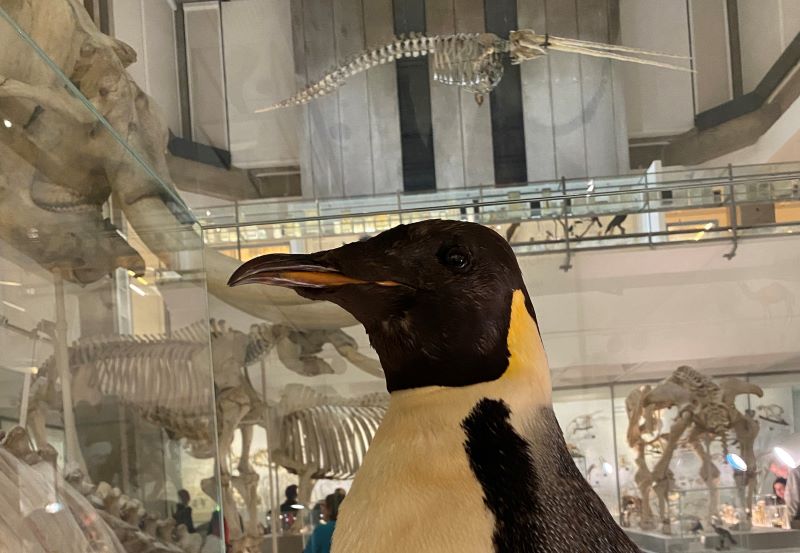
At the Museum of Classical Archaeology, the Bridging Binaries tours have been relaunched with a new team of volunteers, recruited in response to a call-out for ‘queer people to tell queer stories.’ In addition to bringing their own unique insights, the guides have chosen to include a wider range of stories from the ancient world while doing their own research to provide background information and detail.
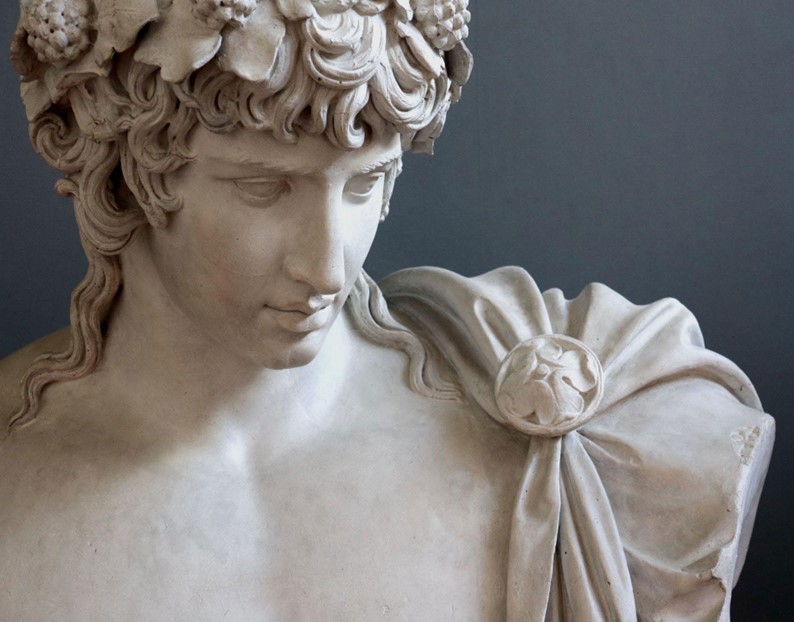
This quarter, nine tours have been delivered across both museums and attended by 116 participants. Visitor feedback underlines the importance and validity of this work to our audiences with:
- 90% of visitors agreeing that the theme was an important factor in their decision to attend
- 84% agreeing that the subject matter was relevant to their lived experience
- 84% agreeing that they were able to gain new insight and knowledge
“Just a quick note to say thank you for advertising and putting on the LGBTQ+ tours of the Museum. I struggled hugely to come out while studying Classics at Trinity (09-12) so it’s wonderful to see these initiatives in the faculty raise awareness and visibility. Please pass on my thanks to the volunteers for this brilliant work.”
“Excellent guide, and fascinating topic. I had no interest in classical archaeology at all previously and now I am looking forward to another tour.”
“I learnt so much about queer behaviour in the natural world! In particular about Ostriches and Platypuses!”
Participant feedback, February 2024
Staff and volunteers have also shared how they have benefited from this activity:
“We are really proud of this work and the positivity it brings to the Museum and to our volunteers. The tours have special meaning for our guides who are either people on their own LGBTQ+ journey, finding their identity or an outlet to express their knowledge and passion for the subject.”
Volunteer Coordinator, Museum of Zoology“I chose to do the tours because promoting diversity and inclusivity in science is very important to me… the process of preparing for and leading the tours has been enjoyable and fascinating.”
“Every tour I give is an ardent love letter to queers past, present and future. Growing up, I was the only one of me. I didn’t meet other queers of my patination and interests until long into adulthood. I would have adored the opportunity to go on one of the tours we give when I was a teenager.”
Volunteer comments
Case Studies: Our Planet
Responding to environmental issues and concerns about climate change in a way which is informative, engaging and empowering is a key aim of the Collections in Action-funded Our Planet projects including the recent, Climate Pasts Climate Futures led by the Sedgwick Museum.
Working with the Kaleidoscope Collective – a group of young people from Parkside Community College – plus educators, early career scientists and a creative practitioner, this project aimed to enable young people to take action against climate change, using the museum collections as a starting point.
Over the last six months the group have been able to expand their learning and skills through workshops and creative sessions including: the history of climate science at the Whipple Museum; a panel discussion and Q & A about climate change and extinction events with Cambridge University climate and earth scientists; what fossil evidence can reveal about changing climates; and how to write for a museum audience.
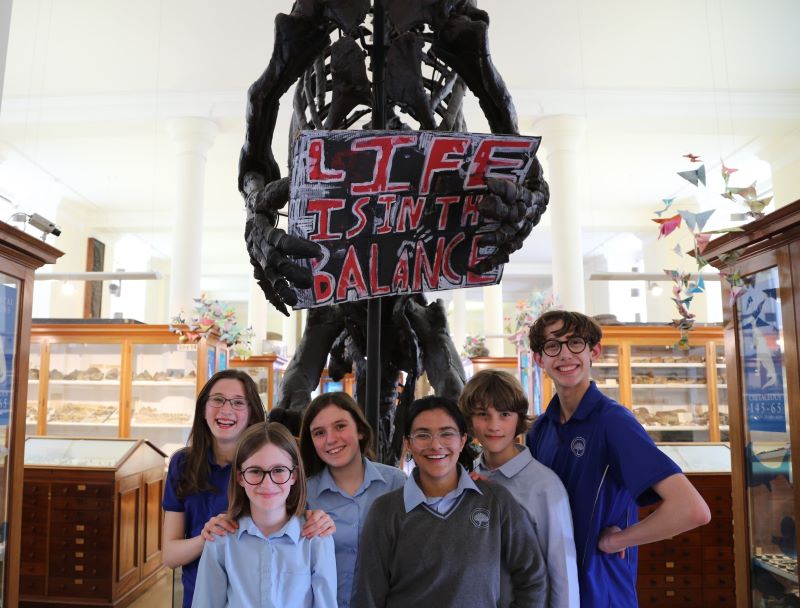
A major outcome of this project has been the creation of the Butterfly Effect, a temporary art installation now on display at the Museum until April, 2025.
Inspired by discovering that butterflies act as an early warning sign to changes in the environment, the group spent the early part of this year collaborating with artist Hilary Cox Condron to create an exhibition featuring hundreds of handmade butterflies arranged throughout the museum, juxtaposed with hand painted warning signs.
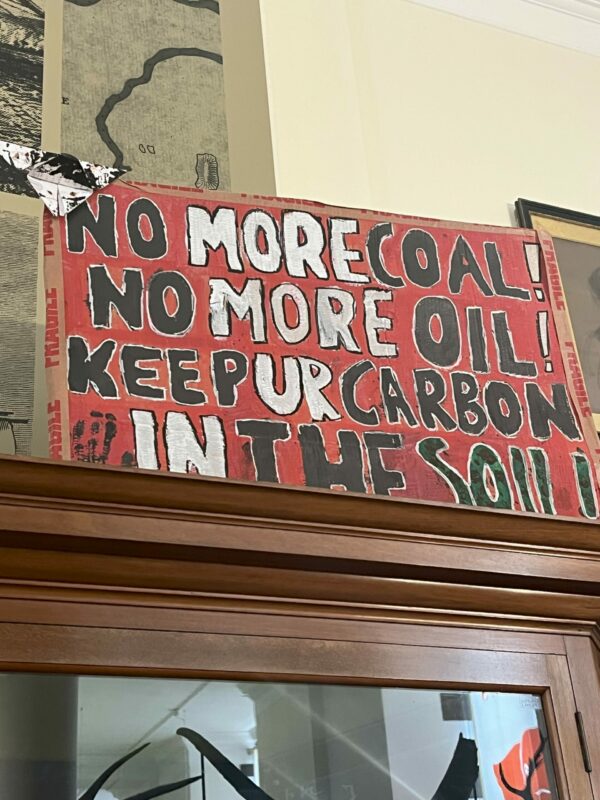
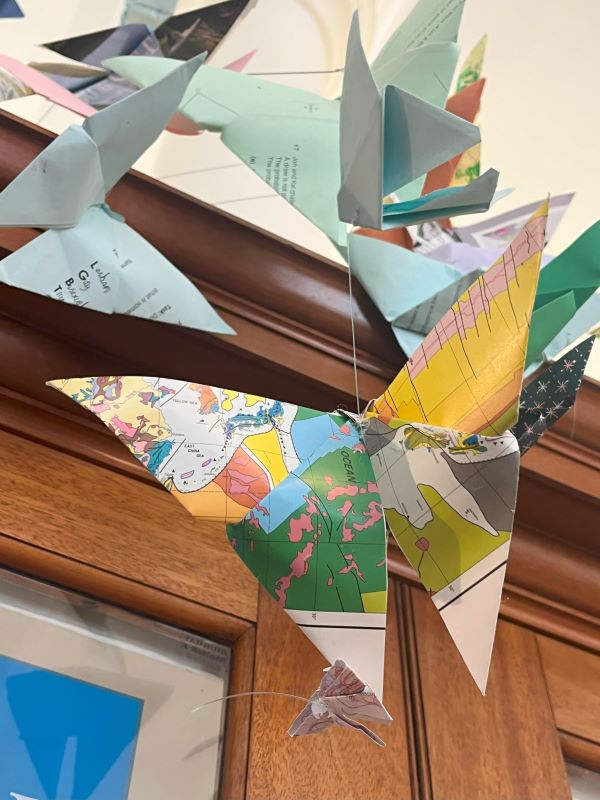
Message from the Butterfly Effect
Describing the impact of working in this cross-collaborative way, Nicola Skipper, Sedgwick Museum Education Coordinator said:
“This programme was created to connect the upcoming generation with our world- leading climate scientists and to give the students a space and voice within the Museum. It’s been wonderful to see them respond to it so enthusiastically and creatively.”
Case Studies: Creating Opportunities
Despite Cambridge’s rich cultural offer, it is also the case that social and economic deprivation in the city is reflected in low cultural engagement, with lower income households less likely to engage with cultural opportunities. Our work with young people delivers activities which raise aspirations and build skills and creative capacity. Working with strategic partner organisations, these programmes target young people in areas of higher socio-economic deprivation.
Creative Schools
Our Creative Schools activity has grown out of our longstanding collaborations with North Cambridge Academy and Soham Village College (part of the Staploe Education Trust). One recent project has seen the piloting of an in-school youth collective with young people from Soham aged 13-15. Examining local history through a Black history lens, the project has focussed on fostering co-research and youth voices within the Fitzwilliam Museum, while providing the young people the opportunity to work with a range of artists, curators, and creatives to explore themes of belonging, identity, and place.
Earlier this year, the group collaborated closely with two creatives: Jemilea Wisdom-Baako of WriterznScribez and Kenny Wing Tao Ho of Gecko Theatre. Blending physical theatre techniques with poetry and imagery that had been developed across the previous term, the youth collective created a promenade performance which was showcased at the Fitzwilliam Museum. The performance demonstrated the collective’s thoughtful and determined feelings around the themes that they had explored and featured alongside an exhibition of their creative responses at an event for their communities.
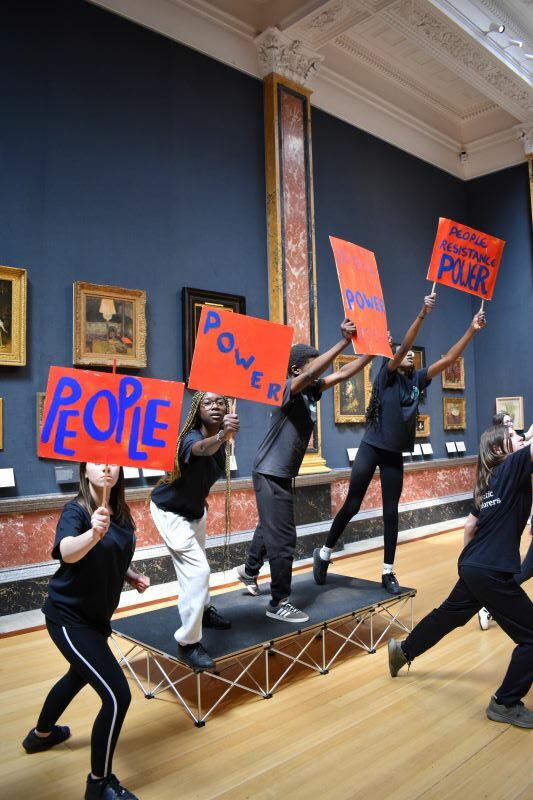
Reflecting on the experience of working collectively in this way:
- 79% of the young people agreed that they had developed their skills and confidence
- 67% agreed that it had raised their awareness of creative opportunities
- 89% agreed that it had made them think about complex histories
The group also shared what they had most enjoyed about their experience:
“Trying new creative practices. Working with new people. Having freedom and control over it.”
“Working with others. Exploring new opportunities. Learning more about the area.”
“The Physical theatre. Meeting new people and becoming a collective. Making something from scratch. Learning new history.”
Another aspect of this project is a programme of CPD for teachers which has included two online videos on amplifying youth voice and inclusivity in education, plus a printed resource. Asked about the impact of taking part in the process on their own teaching practice, teachers commented:
“It’s improved my teaching, and it’s developed me. I value being part of something real, something where there’s an outcome. I value being part of something which is incredibly challenging at times in terms of the scope of it.”
“It’s helped me understand the importance of doing things differently. Just through the nature of teaching it’s very easy to go with what works and be a part of the mould and maybe not take risks.”
“My journey with it has been exhilarating and highly creative and it has filtered into my everyday practice.”
Young Parents
Delivered by charity organisation Romsey Mill, the Young Parents Programme provides key services for teenage and young parents in Cambridge and South Cambridgeshire. The UCM has a long-established partnership with the charity, and our Young Parents creative course is an integral part in Romsey Mill’s programme for families with children under 5 who may be facing disadvantage.
Participation in the course helps to support the young parents to overcome a range of barriers to accessing cultural and educational provision, including financial and logistical, and those relating to confidence. This allows the participants time to focus on their own learning and develop confidence in a supportive and creative environment.
This year, the group took part in a 10-week Bronze Arts Award project across four collections and covered themes and activities including: an installation in the Sedgwick Museum composed of relief sculptures of modern domestic items, and baby and mother handprints created in response to fossilised footprints; the creation of resources for the Sedgwick Museum’s family activities; an opportunity to interview an artist educator on their career pathway; an exhibition review of Making New Worlds: Li Yuan-chia & Friends at Kettle’s Yard; and a skills share session focussed on printing techniques.
Working through the four sections of Arts Award allowed the young parents to collaborate, share their learning and develop new skills, all of which contributed to increasing their confidence.
“I think I should have it as my day job! I thought I did well, my partner got it straight away.”
Comment from young parent following a skill sharing session, February 2024
While the requirement to teach others on the course provided the young parents with the opportunity to develop their leadership skills.
“I used appropriate language which helped my learner how to recreate my layout with ease.”
Comment from young parent, February 2024
Although four participants gained their Bronze Arts Award this year, the course and its delivery have developed over the last half-decade, and we are now considering moving away from the Arts Award format to a model which has more relevance to the young people. This will include a greater focus on increasing confidence, wellbeing, agency and creativity.
Case Studies: Health & Wellbeing
In total, 255 participants have engaged with our Health & Wellbeing programme during Quarter 4. Delivered by the UCM Inclusion Team and focussing on activity which promotes wellbeing, and supports agency, confidence and access for those experiencing health inequalities, sessions are designed to improve physical access to our collections and include Touch Tours, hospital-based sessions and supported visits for those who are homeless or vulnerably housed. Many of these programmes are well-established and have developed and grown over the last decade. This includes our work with older people in supported living settings and those living with a dementia diagnosis.
Portals to the World is a partnership initiative delivered by the UCM with community organisation Dementia Compass. Established in 2012, this popular programme is designed for those living with dementia and their care partner, and provides social and learning opportunities along with gentle exercise.
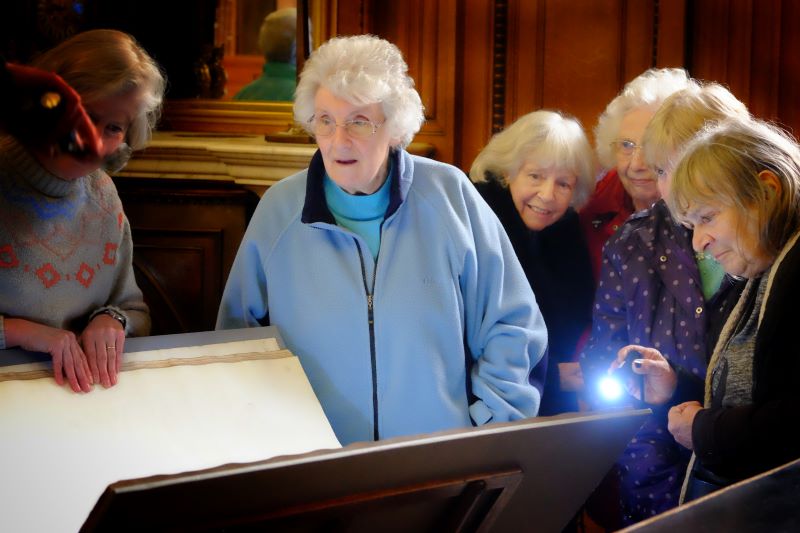
Participants can choose from two sessions a month which run across the museums and the Botanic Garden. Each session combines a short, adapted talk with a guided museum walk, and ends with refreshments and object handling. A team of highly trained volunteers support the sessions and allow respite opportunities for caregivers throughout.
With a rapidly ageing population who are living longer, more people are now living with a dementia diagnosis and the sessions have increasingly grown in popularity. To support demand, the programme now includes a selection of guided walks which are facilitated by a dedicated volunteer team. The walks are accompanied by highlight-style leaflets which are emailed to participants prior to their visit, allowing time to prepare and stimulate interest.
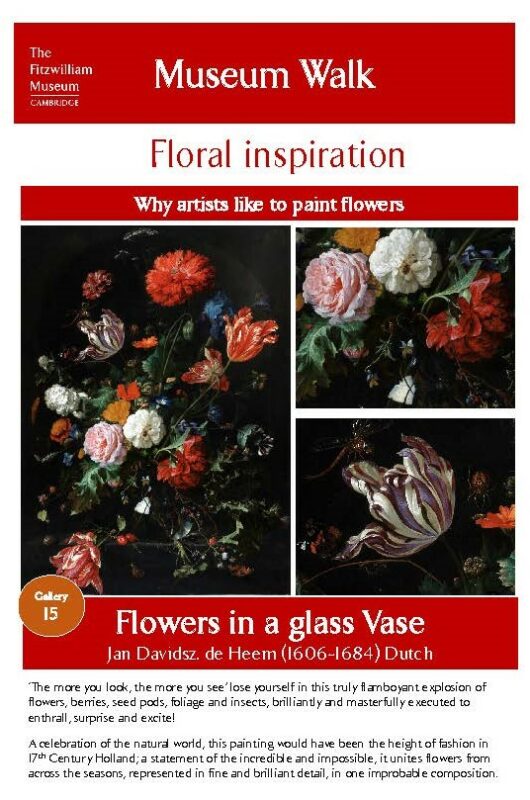
The impact of being with others in a supportive environment, having an opportunity to leave the house and learn about the collections is reflected in comments from participants:
“It puts my situation into perspective, and I realise I am not alone caring for someone with dementia.”
“We like that participants are assigned a volunteer guide and we have felt very well supported on every occasion’ … it’s hugely helpful for me.”
“The sessions offer a rare reason to get out of the house. This is important. In the colder months it can be hard to persuade my partner to go out.”
“This is something to tell our children we have done – including new things we have learned.”
A comprehensive programme of training sessions open to all staff and volunteers is delivered by Dementia Compass three times a year, and a bitesize dementia awareness module will shortly be added to our cross-consortium ‘Warm Welcome’ programme.
“What struck me was the value of being in a learning environment, being treated as a learner, and that having a dementia diagnosis doesn’t lessen this value – perhaps it even increases it – we don’t lose the joy of feeling we are learning.”
Participant feedback, January 2024
Programme Enablement
In addition to the delivery of our NPO-funded activity, we have facilitated a range of work across our consortium which has enabled workforce development and partnership working. Alongside our established offer of Warm Welcome training, Mental Health First Aid, and bitesize Legacies talks, our training offer has continued to expand and develop.
Developed by the Carbon Literacy Project, we have recently piloted Carbon Literacy training for staff delivered by fully trained colleagues from across the UCM. This training is designed to encourage everyone from volunteers to managers, and directors to understand what action they can take, and what sphere of influence they have in the reduction of carbon emissions. Following its success, the training is now being rolled out to all staff and is offered as part of our general training package. Describing the benefits of the training, staff have commented:
“Informative, interesting and really worth attending to better understand the difference you can make both personally and at work.”
“I believe that this training is something any member of any organisation should undergo. Multiple actions are necessary, and we require many individuals for the changes to begin to be noticed”.
Colleague feedback, January 2024
Staff from the UCM Inclusion Team have also delivered sessions on disability awareness, and background training on Parkinson’s and Dance – a new initiative which starts in Y2. This activity for a local branch of Parkinson’s UK and practitioners allowed for discussion, ideas to be tried out and introductions to be made.
“Good to know that the museums are interested in us, I’ve been going to them for many years, since I moved to Cambridge, curious to see what this offer might look like.”
Participant feedback, March 2024
While discrete funding for our Legacies Programme has ended, the importance of this work is widely acknowledged, and planning has taken place during this period to consider how a ‘Legacy of Legacies’ can continue. Meanwhile, we continue to support staff and volunteers in developing their knowledge and confidence to engage with this subject through our programme of bitesize talks. Occurring monthly, recent sessions have included talks from curators and learning colleagues on telling complex and difficult stories, and an introduction to the African Studies Library collections from a colleague at the Centre for African Studies.

